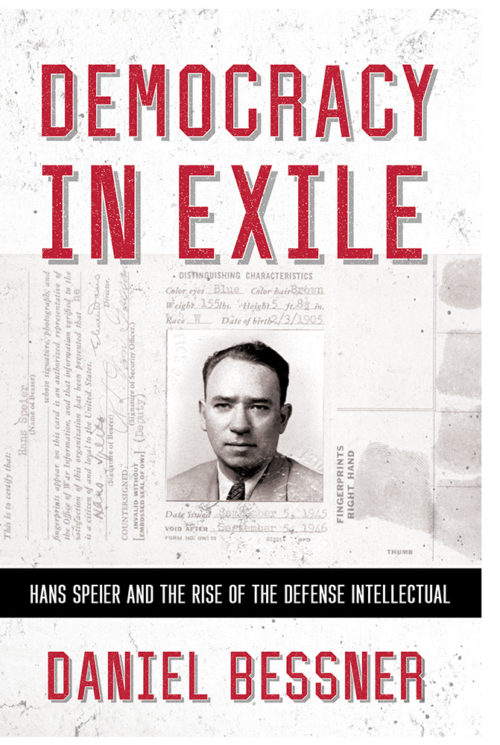The Book
Democracy in Exile: Hans Speier and the Rise of the Defense Intellectual
The Author(s)
Daniel Bessner
Editor's Note
This is the latest in out Democracy in Exile roundtable.

Somehow the quality of the experience even of the victims of American society has not had the complexity and the value as that of the victims of the European. Even to the most hopeless negro in the South nothing like the fall of Weimar or the march on Rome has happened. This does not, of course, make his fate any less bad, any less unbearable, any less discouraging, but it does make it somehow, or so it seems to me now, less instructive.
When Clifford Geertz wrote the above from Indonesia in 1952—the year Invisible Man was published—he was tapping into a peculiar sentiment, found not only among American social scientists, but amidst the highest echelons of the U.S. government. Weimar Envy was an emotional and intellectual projection that presumed American innocence in contrast with European experience. For the self-designated American keepers of the democratic flame in the postwar years, the Weimar exiles carried some hard-won knowledge: they had experienced the death of a democratic regime and lived to tell the tale.
Daniel Bessner’s Democracy in Exile is a thoroughly researched account of one of the less-known wise men of Weimar. Hans Speier does not neatly fit into the accounts we have had of this milieu. Though he appeared to be perpetually reading Goethe in his spare time, he kept his distance from the Weimar exiles who exercised such force on American culture. Nor was he a founder of a school or a teacher with disciples. An aloof and private figure, he is most significant for the worlds he straddled: the German social sciences at their strangled heights in the 1930s and American Cold War special operations. Bessner shows how the former SPD thought-man transformed into a Schmittian policy-mandarin, one disdainful of the wonks rising up on all sides around him. Ever ready to pull back the provisions of democracy whenever he thought democracy imperiled those same provisions, Bessner takes Speier’s life, by the end, to be something of a moral fable: a semi-dark man in dark times.
At the center of Bessner’s study is the question of what intellectuals are for in a democratic society, and what kind of expertise they should and can be expected to provide. In Speier, he shows how the first Ph.D. student of Karl Mannheim spent a good deal of his career betraying some of his master’s guiding principles. For several decades, Speier self-consciously instrumentalized himself as an intellectual in the service of the U.S. state, whose ultimate purposes he rarely questioned. At the same time, Speier seemed aloof from the U.S. scene: he never quite fit into any of its institutions, even though he temporarily mastered some of them—the New School, RAND, etc. The Mannheim vs. Speier thread is one of the most intriguing in Bessner’s book. But instead of dwelling on that, in the space left, I’d like to raise two small questions, and then point to some new territory in American intellectual history that Bessner helps us see.
First, then, the small questions. To what extent does the problem of influence matter to Bessner? Admirably, I think, the book sometimes dispenses with the problem of influence entirely, and doesn’t try to assess or measure the “impact” of this or that memo of Speier’s on this or that part of officialdom. Still, the nagging obligation to account for influence occasionally creeps in. When Bessner discusses the 1953 uprisings in East Germany, for instance, he first says that they were the result of U.S. Special Ops (which were guided by Speier’s belief that mass psychological warfare could still be used East Germany until it became totalitarian, when it would need to revert to elite psychological warfare). But then Bessner doubles back and says, of course, there were many other variables behind the 1953 uprising. The point is not in the details, but simply to what degree Bessner thinks he is compelled to make the case for influence. My second question is: given the milieu he places Speier in, how does he compare to fellow German refugees such as Morgenthau (from Speier’s own generation, himself a sparer with Carl Schmitt) and Kissinger (from the generation after Speier). Would any sustained comparison in the book have been worth undertaking? What does Bessner make of intellectual biographies such as Sharon Ghamari-Tabrizi and Ron Robin’s that put considerable emphasis on their subject’s style and habitus?
Finally, I want to note a research field of sorts that Democracy in Exile opens up. If there has been one enduring continuation of Speier’s experience in the postwar decades, it’s that there have been more and more Speiers—in very different guises—making their presence felt on U.S. foreign policy. Many parts of the executive have based tremendous foreign policy decisions on a very thin line of native informants: Soong Mei-ling (BA Wellesley College), Kanan Makiya (Master’s in Architecture, MIT), Ahmed Chalabi (PhD Math, University of Chicago), and Mahmoud Jibril (PhD, Political Science, University of Pittsburgh), whose encounter with Hillary Clinton at a Paris Westin seems to have ignited her optimism about the 2011 Libyan intervention. In some cases, they come with academic credentials, in some cases not. Bessner gives us an example of how the Weimar experience translated into one type of specially-tailored (if authentically felt) authority. At what other periods, from what other regions, and for what purposes has the U.S. state relied on small numbers of advisors or informants on whom it projects wisdom? How does the state’s appetite for such tendentious insight work?
About the Reviewer
Thomas Meaney is a visiting fellow at the Institute for Human Sciences (IWM) in Vienna.

0